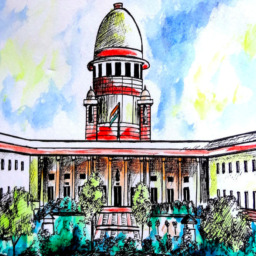INTRODUCTION
The comparison consists of putting together (known as ‘com’) and examining the level of similarity which is (known as ‘parare’).[1] It is a method employed to enable a systematic and objective comparison of the legal system, laws, substantive and procedural practices, and system with that of other jurisdictions. It scrutinizes and tunnels down the purpose of legal research. The procedural practice of comparing various legal aspects has been rehashed since time immemorial. Comparison deals with the similarities and dissimilarities of legal jurisprudence. It may do and often pose questions that are subject to the existence of historical culture. The overarching presence in legal research is analyzed in the context of global information which is based on societal experience. Comparative evaluation of legal systems of the world help brings out the objective solution with objective reasoning.
CLR can be well categorized as doctrinal, non-doctrinal, historical, qualitative, and quantitative. It is pertinent to note that CLR has its limitations and boundaries when applied by national courts. Every country has its own constitutional culture, historical temper upon which the fulcrum of the legal structure stands. Our Indian Supreme Court has traveled a lot across the globe to formulate the constitutional jurisprudence since it sat down at Tilak Marg. Take, for example, Justice D.Y. Chandrachud in Justice K.S. Puttaswamy (Retd.) v. Union of India[2] has referred to or compared to the law relating to privacy. The comparative study of privacy across the geographical landscape has shaped the 266-page opinion, which later became the brooding spirit of the law.
When the streets of Paris on the early morning of July 14, 1789, erupted and challenged the fortress of King Louis XVI with the ideas of Fraternity and Liberty. This influenced the newly born countries in drafting their Constitution, including ours. We gave ourselves the ideas of Fraternity and Liberty in the Preamble exclusively borrowed from the French Revolution.
PROBLEM WITH COMPARATIVE RESEARCH
The avowed object of comparative legal research is to ensure law becomes cycloramic. Laws around the globe are cobwebbed, often with a thread-bearing transnational effect. There has been a problem with comparative legal research regarding the approach of taking out similarities and differences from within the legal system. Each system has its historical brevity which inheres to the laws of that country. The approach which a researcher takes into account varies subjectively. CLR allures the research but can cause affront into the constitutional, cultural, historical human compasses. Some questions need to be pondered upon when legal systems are compared or research is done based on the comparison of legal systems. What is appropriate for a country? Whether legal system should be compared based on dissimilarities or commonness? Whether the principle laid down in one nation tends to be the correct position of law for a modern society like ours? Whether the principles of universalism can be applied? It is axiomatic to note that the common answer is that all depends on countries geographical, ethnicity, cultural, religious, moral values, and political factors.
The heavy reliance on comparative foreign jurisprudence research by the Courts to interpret the statutes of one’s nation is silent acquiescence, without providing a congenial environment to adopt such ‘adopted laws’. Our Apex Court struck down the penal provision Sec. 377 IPC as violative of art. 14, 19(1) (a) and 21 of the Constitution. The govt. vehemently took a contrary view against it and left it to the “wisdom of the court”.[3] The more central question that we are posed with is -effect of Legislature and Executive taking views against judicial interpretation. Striking down the section has become a mere academic exercise without any substantive backing of legislation allowing marriage between same-sex couples, social and job security, reviewing gender-based laws. Albeit inspired by Navtej Singh Johar Case, Zimbabwe High Court has recognized the rights of transgender and a part of Zimbabwean society and culture. The issue extends of which Courts derive from the foreign jurisprudence to strike down the law. Flipping the coin to the other side, the dissenting opinion of Justice DY Chandrachud found its way as a majority of Kenya High Court[4] while striking down the biometric project, Huduma Numba. It is noteworthy to mention that the Jamaican Supreme Court[5] also showed deference to minority opinion while striking down National Identification System as unconstitutional. Thus the central issue around comparative legal research is that it lacks a universalism approach. The view that is found to be contrary may be accepted as the law somewhere around the globe. Answering the abovementioned question is negative the universal acceptance of law cannot be generalised. Neither the comparative legal research can be generalised nor can it have a universal acceptance. Each country is based on the fulcrum of the legal system of civil law, common law, or theological law. Therefore comparison tools highly influence the decision making and we tend to forget the fulcrum on which it grounded.
COMPARATIVE RESEARCH: TO WHAT EXTENT!
A number of misconceptions arise and prevail on the question of how far can a researcher adopt the comparative research in developing their municipal laws. Taking the clue from the above examples, Judges tend to cite United States Supreme Court, United Kingdom Courts, and other foreign courts case laws in substantiating their arguments and interpreting the laws here. Noted academician DD Basu has articulated the special importance of comparative study in interpretation as: “when we borrow the material from other instruments, there arises the need for a comparative research and study and such study assumes much significant for interpretation.”[6]It is manifest that we derive our sources from British era laws. Also, the national courts look for foreign judgments to bring to light the meaning attached to the Constitution from where it has been originally borrowed. It is not a comparison rather an adoption of such interpretation keeping in mind the structural foundation of a particular legal system. Thus comparative legal study assumes significance while interpreting be its constitution or any other law. There is often a dilemma as regards the extent of attaching comparative legal research with municipal laws or local laws. Whether the behavioral structure or social fabric is an influencing factor or aspects to be kept in mind while conducting the legal research. In recent, the Supreme Court struck down the colonial-era law on homosexuality in line with progressive and liberal attitudes. But there has been reluctance among the population to expressly accept the community despite the two landmark judgements on this subject. The subject matter is influenced by the cultural, religious, political and social fabric of a local population.
Overemphasis of CLR will be more like acquiring or resembling the society of another legal system with that of ours. It can be analysing the foreign laws through the lens of our aspirations and easing out the difference and harmonise and reform the legal system.
CONCLUSION
CLR has played a pivotal role in substantive law or procedural law, tort, anti-trust law or ombudsman, Courts, Commission, and various Committees in India to bring out the best. There has been a substantial reference in synchronising and developing the law. Constitutional courts have referred to as many as foreign judgements in deciding cases related to fundamental rights, separation of power, judicial review, and cabinet form of govt. to name a few. There is no shred of doubt that the advent of public interest litigation gave the Courts the upper hand in applying this tool to resolve conflict. The glimpse of comparative legal research is evident from all the drafting of Law Commission reports on Tort Law, Competition Law, Company Law, and Intellectual Property Laws, etc. Through comparison of human experiences and problems led to better evaluation and solving of problems. Total negation of comparative research will not suffice the matter rather a balance is needed to be maintained while adopting this tool. It is the law that effects and influence social order, thus it must be borne in mind that comparison tool in legal research must not be overstated and over-read into the legal system which may destroy the societal fabric upon which it is founded.
Author(s) Name: Atul Kumar Dubey (Student, Masters of Laws in IPR, IIT Kharagpur)
[1] P. Ishwar Bhatt, Comparative Method of Legal Research: Nature, Process and Potentiality, JOURNAL OF THE INDIAN LAW INSTITUTE, Vol. 57(2).
[2] (2017) 10 SCC 1.
[3] Navtej Singh Johar v. Union of India, (2018) 10 SCC 1.
[4] Nubian Rights Forum v. Attorney General, Ruling No. 3, April 1, 2019
[5] Julian J. Robinson v. Attorney General of Jamaica, Claim No. 2018 HCVO1788.
[6] Dr. Durga Das Basu, COMPARATIVE CONSTITUTIONAL LAW, Lexis Nexis, 3rd edition, (2020).
















